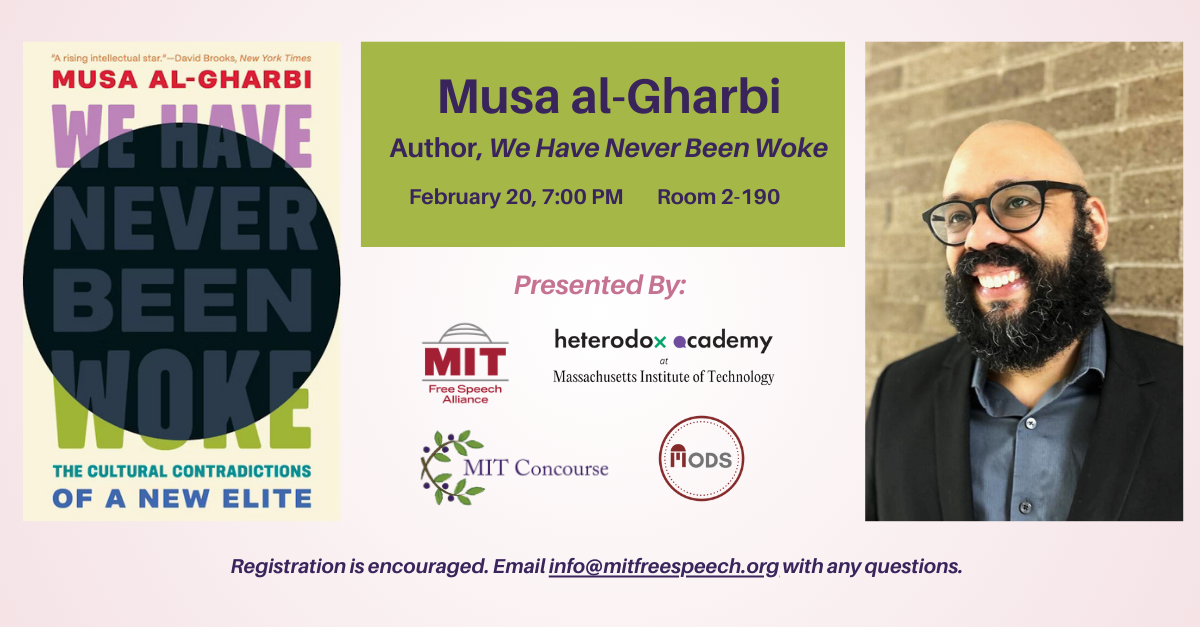‘We Have Never Been Woke’ Author Musa al-Gharbi to Speak at MIT February 20
‘We Have Never Been Woke’ Author Musa al-Gharbi to Speak at MIT February 20
February 12, 2025
The MIT Free Speech Alliance is excited to bring author and scholar Musa al-Gharbi to MIT next Thursday, February 20, for a discussion of his acclaimed new book We Have Never Been Woke: The Cultural Contradictions of a New Elite. Al-Gharbi will speak from 7:00-8:30 p.m. in room 2-190 on MIT’s campus, and the event is free and open to the public. Professor al-Gharbi’s lecture is additionally presented by MIT’s Heterodox Academy campus community, the MIT Open Discourse Society, and MIT Concourse.
Musa al-Gharbi is a sociologist and assistant professor in the School of Communication and Journalism at Stony Brook University. His research primarily focuses on the political economy of knowledge production and the social life of scholarly and journalistic outputs. He is a columnist for The Guardian, and his writing has also appeared in the New York Times, the Washington Post, the Atlantic, and more.
We Have Never Been Woke was published in 2024 by Princeton University Press, which summarizes the book as follows:
Society has never been more egalitarian—in theory. Prejudice is taboo, and diversity is strongly valued. At the same time, social and economic inequality have exploded. In We Have Never Been Woke, Musa al-Gharbi argues that these trends are closely related, each tied to the rise of a new elite—the symbolic capitalists. In education, media, nonprofits, and beyond, members of this elite work primarily with words, ideas, images, and data, and are very likely to identify as allies of antiracist, feminist, LGBTQ, and other progressive causes. Their dominant ideology is “wokeness” and, while their commitment to equality is sincere, they actively benefit from and perpetuate the inequalities they decry. Indeed, their egalitarian credentials help them gain more power and status, often at the expense of the marginalized and disadvantaged.We Have Never Been Woke details how the language of social justice is increasingly used to justify this elite—and to portray the losers in the knowledge economy as deserving their lot because they think or say the “wrong” things about race, gender, and sexuality. Al-Gharbi’s point is not to accuse symbolic capitalists of hypocrisy or cynicism. Rather, he examines how their genuine beliefs prevent them from recognizing how they contribute to social problems—or how their actions regularly provoke backlash against the social justice causes they champion.
Al-Gharbi’s analysis of the “symbolic capitalist” class – whose goals he broadly shares – has won praise from across the ideological spectrum for its rigor and independence. Its publication a handful of weeks before the 2024 presidential election rendered its critiques all the more timely, as many now seek to understand the seeming reversal of the symbolic capitalist class’ political fortunes and what it means for the future.
“We’re delighted to partner with MODS, MIT Concourse, and MIT’s Heterodox Academy campus community to bring Musa al-Gharbi to MIT,” said MFSA President Wayne Stargardt ‘74. “A key part of our mission is to bring heterodox speakers to campus to engage with the MIT community, and we look forward to hosting a lively discussion of this important academic work.”
Professor Al-Gharbi’s speech is free and open to the public, and registration is encouraged. Attendees can register on MFSA’s website, and are encouraged to email MFSA Executive Director Peter Bonilla with any questions.
Permalink.
Permalink.
